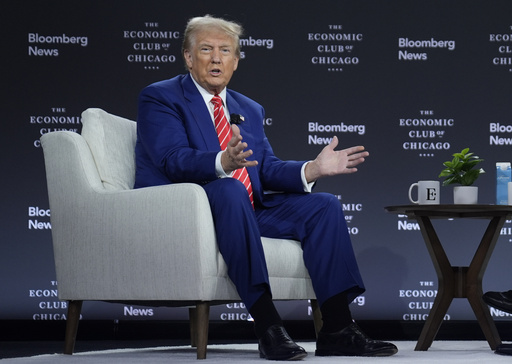
CHICAGO — On Tuesday, Donald Trump took the opportunity to reiterate his frequent assertion that imposing significant tariffs on imported goods could serve as a solution to various economic challenges. He claims that such measures would generate substantial revenue for the U.S. government, safeguard American businesses from international competitors, and encourage foreign corporations to establish operations within the United States.
During his appearance at the Economic Club of Chicago, the Republican presidential candidate emphasized that tariffs are widely misunderstood as an economic instrument. “To me,” Trump stated, “the most beautiful word in the dictionary is tariff. It’s my favorite word. It needs a public relations firm.”
Despite his enthusiasm for tariffs, critics, including established economists, argue that they function more like a tax on American consumers. They contend that tariffs can lead to diminished economic efficiency and contribute to rising inflation in the U.S.
The conversation, moderated by John Micklethwait from Bloomberg News, occasionally veered off-topic, especially when Trump began discussing issues such as voter fraud and his grievances with technology companies like Google. The dialogue often returned to Trump’s familiar themes around immigration, electoral fairness, and sports participation regulations.
Focusing on his potential second term as president, Trump mentioned utilizing the threat of tariffs to negotiate better terms with other world leaders. He proposed a hefty 60% tariff on Chinese imports and suggested imposing tariffs of up to 20% on other imported goods. Furthermore, he indicated that he might consider higher tariffs on businesses operating in Mexico and American firms contemplating overseas relocation.
Initially acknowledging the differing viewpoints he and Micklethwait held regarding trade and economic policies, Trump enjoyed the chance to express his disagreement with the moderator. Although the audience was not as boisterous as at his typical rallies, they were supportive, laughing and applauding his remarks throughout the event.
Tensions occasionally flared, particularly when Micklethwait pointed out that Trump’s tariff strategies could raise consumer prices and questioned the sustainability of his tax reduction promises, suggesting they could exacerbate the national deficit. Trump responded by sharing familiar anecdotes while maintaining that mainstream economists and media figures were incorrect in their assessment of tariff impacts, arguing that financial burdens are shouldered by foreign countries, not American consumers.
He also made references to the aftermath of the 2020 election, controversially claiming a peaceful transfer of power, despite the fact that it was marred by the violent events at the U.S. Capitol on January 6, 2021.
In reflecting on the Republican party, Trump labeled it the party of “common sense,” highlighting issues such as border security, election integrity, and policy surrounding transgender athletes. He reiterated allegations that the Biden administration has deliberately allowed dangerous foreign criminals to enter the United States.
Throughout the interview, Trump has been known for his reluctance to engage in critical discussions with mainstream media outlets and often resorts to engaging with conservative or friendly media figures instead.
Concluding his remarks, Trump criticized Micklethwait for what he perceived as an erratic interviewing style, urging him to maintain a focus on one topic at a time. Micklethwait pointed out the multitude of subjects being covered, to which Trump responded with his term “the weave,” explaining his approach to discussing various topics in a dynamic manner.
The interview resonated positively among Trump’s supporters, with former White House aide and current adviser Stephen Miller declaring it one of the best economic discussions by a political figure in recent memory.

